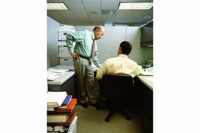My wife just got back from a trip with the kids, and somewhere along the way the windshield caught a rock. No big deal; that’s why we have insurance. But that event got me thinking about what types of insurance a food production facility should carry.
Having been around recalls and foodborne illness outbreak investigations, having previously worked for the U.S. Department of Agriculture’s Food Safety and Inspection Service (USDA-FSIS), and running my own business, I am aware that having the proper insurance is critical.
I know a little about general liability, a bit more about professional liability and more than I want to about workers’ compensation. Because I know so little, I reached out to Cole Williams of Insurance Associates to help educate us on the types of insurance, and what we really need. Here’s what Williams had to say:
“You don’t know what you don’t know until you know it” is a phrase that has unique application to today’s insurance and legal environment. It is true that you don’t know what you don’t know. Unfortunately, the “until you know it” part is very costly, because you don’t find out until after an incident that something is not covered. In relation to liability, the cost becomes compounded because you’re not just liable to the people who become ill. You’re also liable to your customers and their supply-chain partners for expenses incurred as a result of your actions.
There’s a lot to this topic so I will focus my thoughts on liabilities related to an outbreak of a foodborne illness. I will discuss the differences between general liability and product recall coverage, how strict liability applies to a meat processor, common exclusions and a couple tips to take to your agent or broker.
General liability (GL) protects you and your business from general claims involving bodily injuries or property damage. Contaminated Products Insurance (CPI), or commonly known as Product Recall Insurance, fills the gap created by the Recall of Products, Work or Impaired Property exclusion. Put simply, GL pays for the cost of the illness and CPI pays for the costs to recall and replace the product and any third-party loss of income for which you are liable, along with the costs to rehabilitate your reputation.
To say meat processors need GL insurance is an understatement. The other insurance they desperately need to carry in one form or another is CPI.
The products and completed operations liability of a meat processor is slightly different than that of a non-manufacturing business. In most general liability claims, the burden of proof is on the injured party to prove the individual or business was liable. Meat processors, however, are held to a different standard called strict liability.
A common example of strict liability is a dog bite. While each state has different statutes for dog-bite litigation, they’re generally consistent in the fact that the owner of the dog is strictly liable for injuries suffered from contact with their dog. You might not have known your dog would bite someone, but they did, and now you’re responsible for the injuries.
Food processing is held to the same standard. You probably didn’t know your incoming product contained E. coli or that an employee in your finished room had Listeria on his or her boots or that the consumer undercooked their hamburger. Knowledge is irrelevant to the larger issue — people became ill from your products and you’re strictly liable, even for the product that consumers are handling unsafely.
The Commercial General Liability form has three exclusions that underlie the need for CPI. They are:
- Damage to your product;
- “Property damage” to “your product” arising out of it or any part of it;
- Damage to your work;
- “Property damage” to “your work” arising out of it or any part of it and included in the “products-completed operations hazard”;
- Recall of products, work or impaired property;
- Damages claimed for any loss, cost or expense incurred by you or others for the loss of use, withdrawal, recall, inspection, repair, replacement, adjustment, removal or disposal of: (1) your product; (2) your work; (3) impaired property — if such product, work or property is withdrawn or recalled from the market or from use by any person or organization because of a known or suspected defect, deficiency, inadequacy or dangerous condition in it.
The basis of these exclusions makes rational sense. General liability is primarily a third-party coverage intended to indemnify others for your actions. Because you cannot be liable to yourself, it makes sense that these exclusions exist.
If there are claims for foodborne illness, it’s reasonable to assume that a product recall was initiated alongside it. There are many more product recalls initiated than there are foodborne illness suits. That’s a good thing, because it tells us that the food-safety systems are working and processors are being responsible. The bad thing is most meat processors operate under the assumption that product recall is covered by their general liability policy. As we’ve discussed above, that is unequivocally false.
There are varying forms for CPI, and some have even been standardized by the Insurance Services Office (ISO). Unfortunately, those forms are limited and often only reimburse for product recall expenses.
The costs associated with a recall go in stages. The first stage is the expense to recall and replace the product from commerce. The second is the reputational damage meat processors suffer from issuing a voluntary recall. The third, and often most costly, is the third-party loss of income from points of contact downstream. When businesses fail to make it through a recall, it’s often because there was insufficient coverage for the second and third stages of the loss.
So, what should you do to take control of this situation?
First, sit down with your agent and address the adequacy of your GL limits. Most GL polices come standard with $1 million per occurrence and $2 million in the aggregate. They then purchase a commercial excess policy that provides higher limits.
The sage guidance says that you should CYA — cover your assets — because that’s what will be liquidated in the event of a major judgment. That’s a good starting point, but you need to take it a step further. Data from the Centers for Disease Control and Prevention (CDC) suggests the average foodborne illness case costs upward of $50,000 in medical expenses and untold amounts in litigated settlements. Depending on the breadth of your distribution and type of product, it doesn’t take many illnesses to max out the standard limits of $5 million.
Second, purchase product recall coverage. When picking a carrier and policy form, you want to make sure that the carrier is reputable and offers a form that includes Malicious Product Tampering, Accidental Contamination and Governmental Notice. When you’re thinking about the limit, assume you’re going to have to recall five to 10 days’ worth of production to fully isolate the lots and think about the income generated from one day’s production. You also want to make sure the form provides coverage for first- and third-party loss of income.
Third, engage the services of a food safety consultant who has worked with recalls in the past. Because you’re strictly liable to the public, and often contractually liable to your customers, there is no excuse to not invest in outside food safety help. Having your system evaluated by an outsider who is focused on identifying and helping you mitigate your risks can be invaluable. Remember, you want someone who is reporting to you, not reporting to a third party.
The meat business is a hard way to earn a living. Thin margins, costs to comply with regulation, labor shortages and a finicky consumer marketplace all add to the already difficult task of manufacturing meat products. It’s a lot ask a business owner, or their support team, to also be insurance and risk management experts, so invest the time in your relationship with your broker and food safety consultant. Your customers trust you to make safe food. You need to trust your broker and food safety consultant to help you deliver on your promise to your customers. NP






